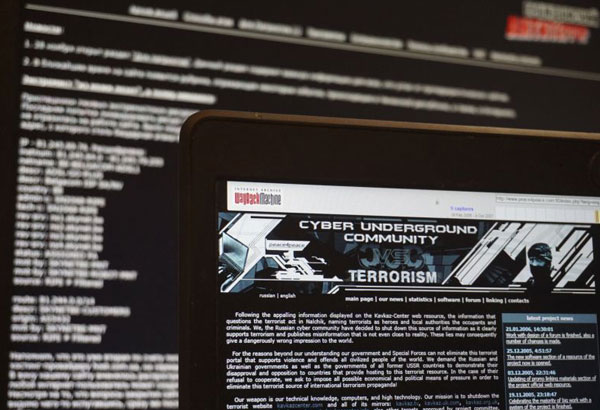Russian man wanted by US alleged to be prolific spam master

In this July 24, 2017 photo, archived versions of two Russian anti-terrorism websites on a computer screen are photographed, in Paris. The now-defunct websites were the brainchild of alleged hacker Pyotr Levashov, according to Andrei Soldatov, an expert on the Russian security services. The U.S. has orchestrated the arrest of five alleged Russian cybercriminals across Europe in the past nine months. The operations come at a fraught moment in relations between Russia and the U.S., where politicians are grappling with the allegation that Kremlin hackers intervened in the 2016 election. (AP Photo/Raphael Satter)
MOSCOW — From the early days of online stock scams to the increasingly sophisticated world of botnets, pseudonymous hacker Peter Severa spent nearly two decades at the forefront of Russian cybercrime.
Now that a man alleged to be the pioneering spam lord, Pytor Levashov, is in Spanish custody awaiting extradition to the US, friends and foes alike are describing the 36-year-old as an ambitious operator who helped make the internet underground what it is today.
"Levashov is a pioneer who started his career when cybercrime as we know it today did not even exist," said Tillmann Werner, the head of technical analysis at US cybersecurity company CrowdStrike.
"He has significantly contributed to the professionalization of cybercrime," said Werner, who has tracked the alleged hacker for years. "There are only very few known criminals that had a similar level of influence and reputation."
Born in 1980, Levashov studied at High School No. 30 , one of the first schools in the Soviet Union to specialize in computer programming. Even at a competitive institution whose alumni went on to universities and Silicon Valley firms, Levashov stood out.
"He did have an entrepreneurial streak for sure," former classmate Artem Gavrilov said. "He was a leader in school, tried to prove to everyone that he was the best."
Levashov graduated in 1997, according to an entry published to an alumni website, listing his profession as "websmith" and "programmer." Within a couple of years he had gravitated toward the burgeoning field of email spam, according to an ad attributed to him in US court documents.
With much of the world still just discovering the internet and few restrictions on the mass distribution of email, spammers more or less operated openly, blasting inboxes with pitches for Viagra knock-offs, online gambling and pornography in return for a flat fee or a cut of the proceeds.
Internet registry records preserved by DomainTools suggest Levashov launched a bulk mailing website called e-mailpromo.com in August 2002 under his real name. Early marketing material for the site boasts of "Bullet Proof Web Hosting," a term used to describe providers that shrug off law enforcement requests.
The service would come in handy as the spam business became increasingly criminalized. With laws tightening and digital blacklists getting better, spammers resorted to hacking to get their mail across, using malicious software to turn strangers' personal computers into "proxies" — a euphemism for remote-controlled conduits for junk mail. Hackers herded the proxies into vast botnets, armies of compromised machines that silently churned out spam day and night.
Court documents suggest that Levashov teamed up in 2005 with Alan Ralsky, a legendary bulk email baron once dubbed the "King of Spam." More than a decade later, Ralsky still raved about the hacker's skills.
"No doubt he was the best there ever was," Ralsky said in a telephone interview.
It was with Ralsky that Levashov is alleged to have plunged into the world of the "pump-and-dump," a scheme that worked by sending millions of emails talking up the value of thinly traded securities before selling them at a profit and leaving gullible investors to soak up the loss.
Ralsky, Levashov and several associates were indicted for fraud in 2007; Ralsky went to prison while Levashov — safe in Russia — avoided arrest.
By that point, Levashov was cybercrime nobility in his own right. He promoted the idea of teaming hackers up with Russian authorities, spearheading efforts to knock out anti-government websites, according to Andrei Soldatov, an expert on Russia's intelligence services.
At the same time, he was allegedly running a forum for spammers as well as the massive Storm botnet, whose sophistication drew global attention.
"There were spam botnets, certainly, before Storm, but it took things to a next level," Joe Stewart, a security researcher with cyberdefense startup Cymmetria who grappled with Storm at its height, said.
Clever use of peer-to-peer technology and a fast-shifting digital infrastructure meant Storm could be regenerated quickly if part of its network was blocked. Respected security expert Bruce Schneier marveled at its engineering, writing in 2007 that Storm was "the future of malware."
- Latest
- Trending




























